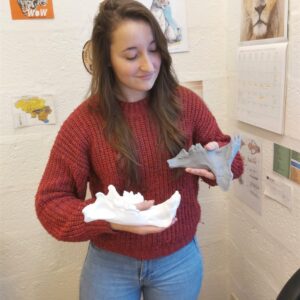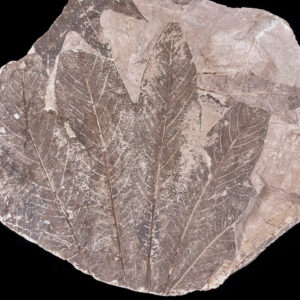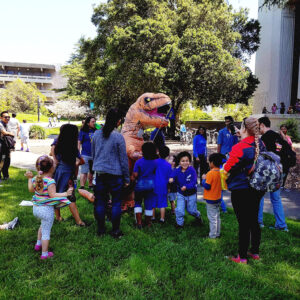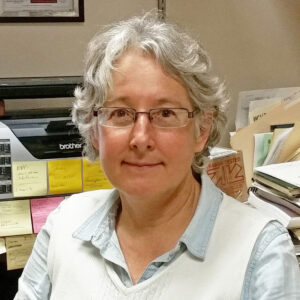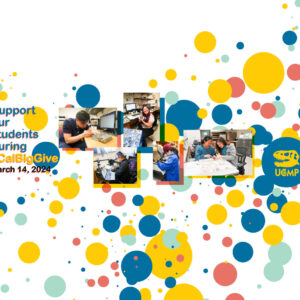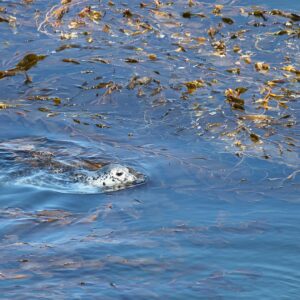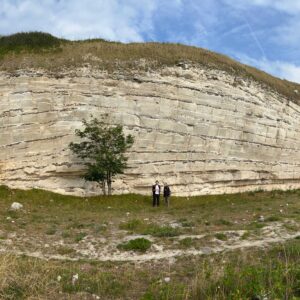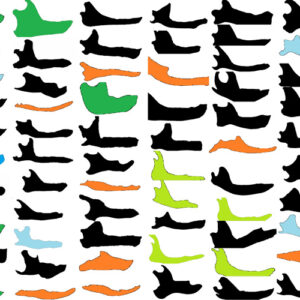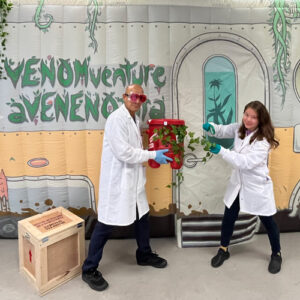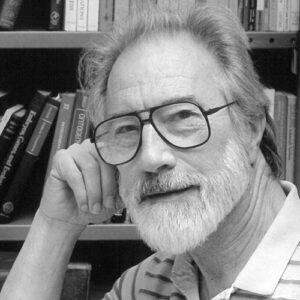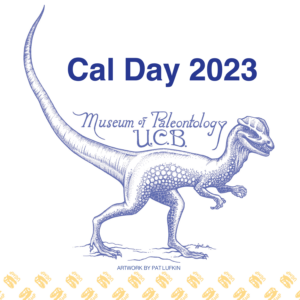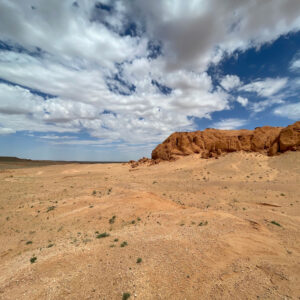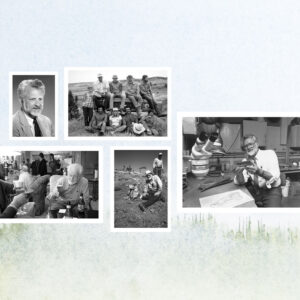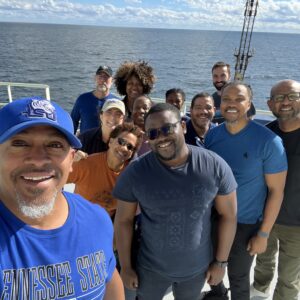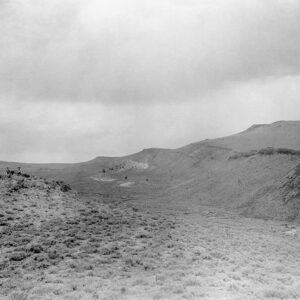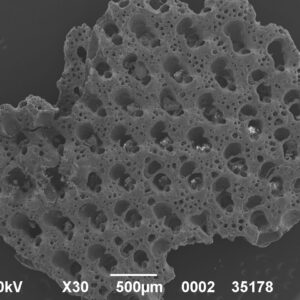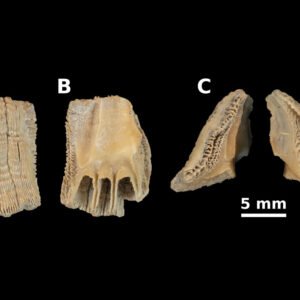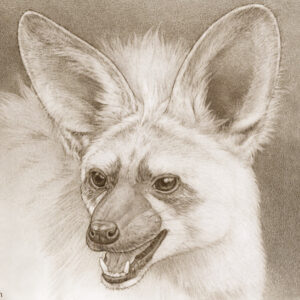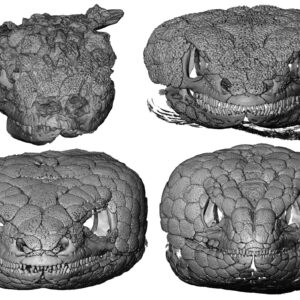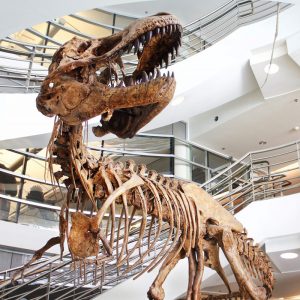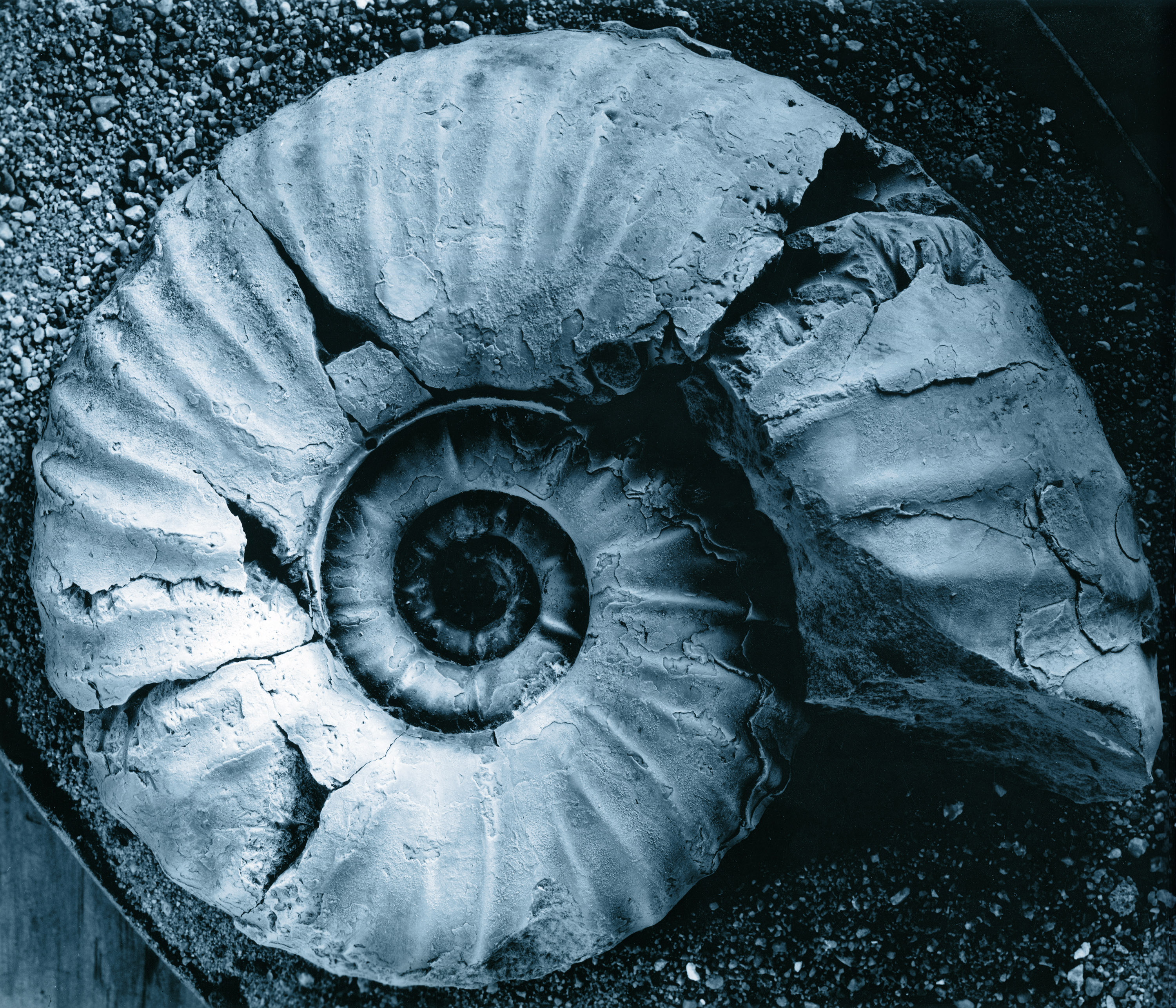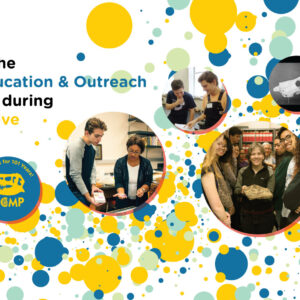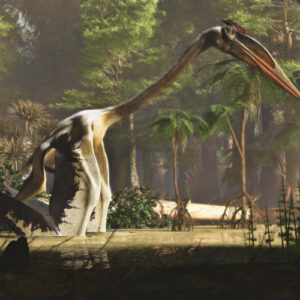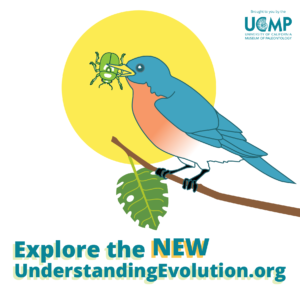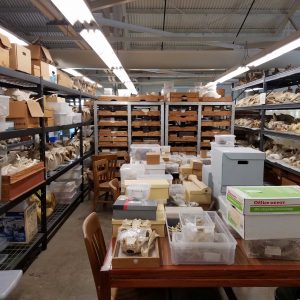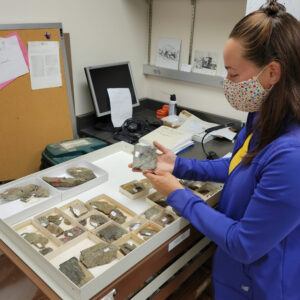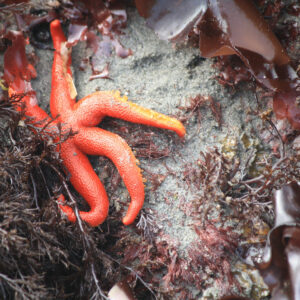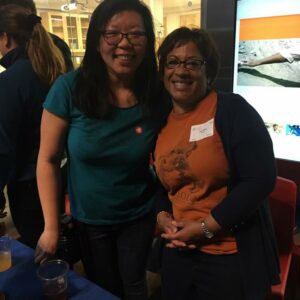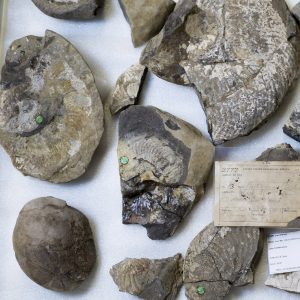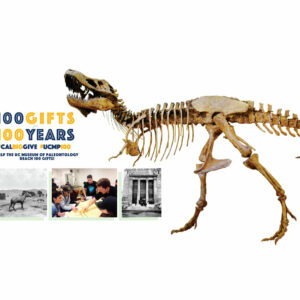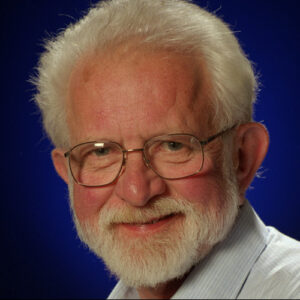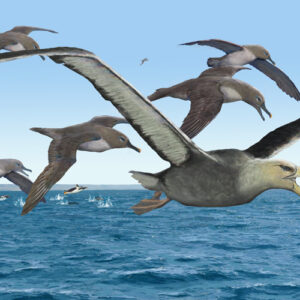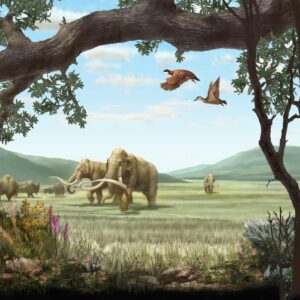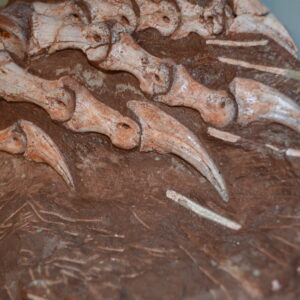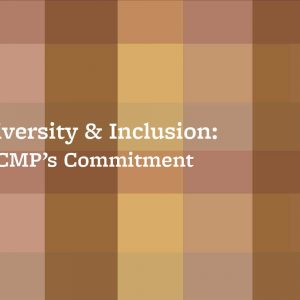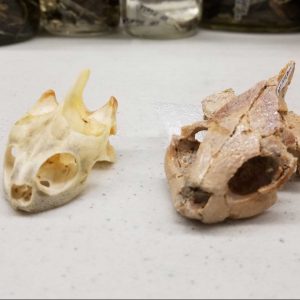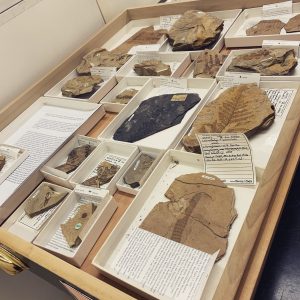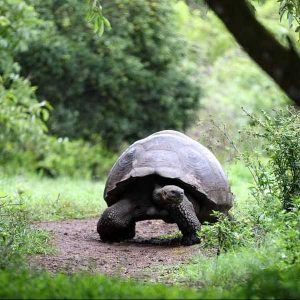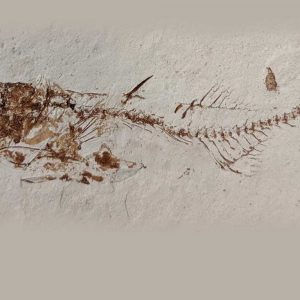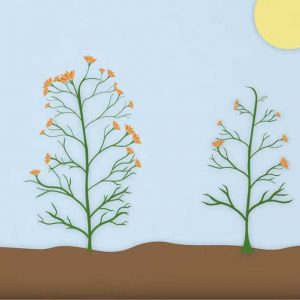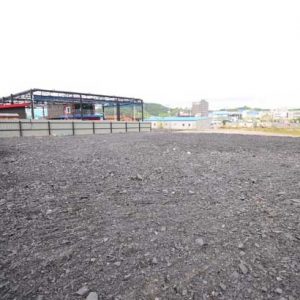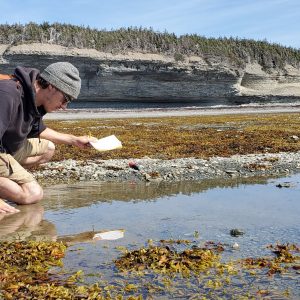Narimane Chatar, current NSF Postdoctoral Fellow in Jack Tseng's lab, was awarded the Marie Skłodowska-Curie Actions (MSCA) Postdoctoral Fellowship to begin December of this year. The MSCA Postdoc is a competitive award from the European Union and funds up to 3 years of research work. Narimane will spend two years of her fellowship working with Jack at UC Berkeley, followed by a third year in collaborator Borja Figueirido's lab at the University of Malaga in Spain. Her project is titled … [Read more...] about Narimane Chatar awarded MSCA Postdoctoral Fellowship
Apply for Senior Museum Scientist position at UCMP
Come join us at UCMP! Apply now for our senior museum scientist position to oversee UCMP's paleobotany collections and museum labs. UCMP houses the pre-eminent paleobotany collection on the West Coast. The collection is global in scope, but its greatest strengths are in the Cenozoic (with plenty of Paleogene) floras of California, Oregon, and Washington. The collections continue to grow through fieldwork by University of California faculty, staff, and students as well as donations from private … [Read more...] about Apply for Senior Museum Scientist position at UCMP
UCMP welcomes admitted students on Cal Day 2025
The University has made Cal Day a day for admitted students and their families. UCMP will be tabling on Cal Day, Saturday, April 19, 2025 from 10am-4pm in the STEM Bonanza Tent along with other members of the Berkeley Natural History Museums on the North Lawn of the Valley of Life Sciences building. We’ll be displaying fossils and have information on student opportunities. Students can “Meet the T. rex” from 11:00 am - 2:00 pm in the atrium of VLSB, 1st floor, in front of the life-size … [Read more...] about UCMP welcomes admitted students on Cal Day 2025
Diane Erwin receives 2025 Chancellor’s Outstanding Staff Award
Diane has been an invaluable member of the UC Museum of Paleontology community for the past thirty years, managing a world-class paleobotanical fossil collection and ensuring its longevity and accessibility for generations to come. And while Diane has many years of service at UC, in the past 3 years she has only ramped up her work. She has taken on leadership roles in three separate and unrelated collections grants and is managing multiple large digitization grants, coupled with mentoring dozens … [Read more...] about Diane Erwin receives 2025 Chancellor’s Outstanding Staff Award
Support science and the UCMP during #Cal Big Give!
The UCMP has long been dedicated to providing a diversity of innovative and engaging resources for STEM education, bridging the gap between ground-breaking scientific research and both formal and informal science education. Outreach Programming UCMP has a rich history of offering high quality educational web resources since the early days of the web. In 1995 we launched the UCMP home page, one of the first online resources in paleontology! In 2004 we launched the Understanding Evolution … [Read more...] about Support science and the UCMP during #Cal Big Give!
How Fish Sense The World: Insight Into The Lateral Line System
How do we perceive the world around us? In order to understand what surrounds us, we utilize all our senses to make informed decisions. Similarly, this can be applied to the fossil record, as studying the sensory biology of extinct animals can provide insight into the environment they were living in. My research is centered around exploring the diversity of the cephalic lateral line system across phylogeny and different environments. The cephalic lateral line system allows fish and aquatic … [Read more...] about How Fish Sense The World: Insight Into The Lateral Line System
The UCMP Annual Short Course is back!
The Making of Habitable Planets and the Origin of Life Save the Date! Saturday, March 1, 2025, 9am - 4pm The UC Museum of Paleontology (UCMP) Short Course is back after a long hiatus! From the Big Bang to the formation of the stars, planets and elements, questions about the formation of our solar system, the shaping of planet Earth, and the origin of life remain. Please join us to hear leading UC Berkeley and Lawrence Livermore National Laboratory scientists speak on the origin of … [Read more...] about The UCMP Annual Short Course is back!
Meet the T. rex and STEM Bonanza for Cal Day 2024
UCMP will be tabling at the STEM Bonanza Tent located on the North side of the Valley of Life Sciences Building to welcome prospective students and their families on Cal Day, Saturday, April 13, 2024 from 9am-4pm. We'll be displaying fossils and have information on student opportunities. For those interested in learning more about Tyrannosaurus rex, please head inside VLSB to “Meet the T. rex” from 11:00 am -1:00 pm in the atrium of VLSB, 1st floor, in front of the life-size … [Read more...] about Meet the T. rex and STEM Bonanza for Cal Day 2024
Support our students during Big Give!
Support our students during #CalBigGive! Undergraduates from across Berkeley campus find their way to the UCMP via classes taught by our faculty and graduate students and through the Undergraduate Research Apprenticeship Program (URAP), finding the varied research programs among members of the community to align with their field of study as well as their personal interests. Many of our student assistants have a deep interest in paleontology and geology, and working in … [Read more...] about Support our students during Big Give!
Grasshoppers, kelp, and frogs featured in recent publications from UCMP
The New Year ushers in a trio of publications from members of the UCMP community: Graduate student Jaemin Lee and collaborator Nick Famoso published on the oldest (29-million-year-old!) fossil grasshopper nest. Find the paper published on eScholarship. Professor Cindy Looy, collaborator Steffan Kiel and UCMP alum Rosemary Romero published a study on the age of fossil kelp holdfasts and the marine communities built upon them. Read more about it from this UC … [Read more...] about Grasshoppers, kelp, and frogs featured in recent publications from UCMP
How do mass extinctions reshape ecosystems?
Collecting Bryozoa from Stevns Klint, Denmark 70 million years ago, Denmark was a warm sea. Rich and varied communities of invertebrates inhabited the seafloor. These ecosystems left behind vast chalk deposits, which have been mined for building material, writing utensils, and fertilizer for over a thousand years. The chalk is also special to paleontologists, because it is rich in fossils and spans the Cretaceous-Paleogene (K-Pg) boundary, one of the largest mass extinctions in Earth’s … [Read more...] about How do mass extinctions reshape ecosystems?
A jaw-dropping conundrum: Why do mammals have a stiff lower jaw?
From the 20-foot-long jawbones of the filter-feeding blue whale to the short, but bone-crushing, jaws of the hyena and the delicate chin bones of a human, the pair of lower jawbones characteristic of mammals have evolved with amazing variation. But at first glance, having a single bone on each side of the head — which creates a stiff lower jaw, or mandible — doesn’t appear to give mammals an advantage over other vertebrates, which have at least two and as many as 11 bones comprising each side … [Read more...] about A jaw-dropping conundrum: Why do mammals have a stiff lower jaw?
The UCMP’s Escape Room teaches fundamentals of evolution
The UCMP's Education and Outreach team just launched their most recent project: VENOMventure | aVENENOtura. In collaboration with the University of Kansas Biodiversity Institute and Natural History Museum in Lawrence, VENOMVenture premiered over the last two weeks at the Berkeley Public Library. Read more about the launch and the rave reviews on the UC Berkeley news site. … [Read more...] about The UCMP’s Escape Room teaches fundamentals of evolution
The life and impact of Jim Valentine, 1926-2023
Jim Valentine, UCMP Curator and Professor Emeritus of Integrative Biology, passed away on April 7, 2023 of natural causes. Read about his life and impact on paleontology in UC Berkeley News. … [Read more...] about The life and impact of Jim Valentine, 1926-2023
UCMP will be participating in STEM Bonanza on Cal Day
Find the UCMP table on the South Lawn along Campanile Way at the STEM Bonanza Hub along with others from the Berkeley Natural History Museums on Cal Day on Saturday April 22, 2023! New, incoming students and their families are welcome to stop by to see fossils on display and ask about student opportunities. “Meet the T. rex” from 11:00 am -12:00 pm in the atrium of VLSB, 1st floor, in front of the life-size Tyrannosaurus rex cast. UCMP graduate students will be there to answer questions … [Read more...] about UCMP will be participating in STEM Bonanza on Cal Day
Cross-Cultural Connections in Paleontology
THUNK. CA-CHUNK. THUD-THUD-THUD. Our Toyota sedan was not built for the desert. We had blown a tire, out on the remote highway from the Mongolian capital of Ulaanbaatar to the small city of Dalanzadgad, a six hour drive from north to south through the Gobi Desert. The three of us were a team of Filipino, American, and Mongolian educators and paleontologists, heading to the Gobi to lead the summer teacher education program and student summer camp in paleontology. The pitted and … [Read more...] about Cross-Cultural Connections in Paleontology
Announcing the William A. Clemens Memorial Fund in Vertebrate Paleontology
The UCMP is excited to announce the establishment of the William A. Clemens Memorial Fund in Vertebrate Paleontology. It was made possible by generous donors in the UCMP community who care deeply about the museum, its future, and its educational and scientific missions. The annual disbursement from this fund will be used to support UCMP's vertebrate paleontology collections, including the maintenance and curation of fossils, staffing, and its use by students and visiting scholars. This … [Read more...] about Announcing the William A. Clemens Memorial Fund in Vertebrate Paleontology
Science at sea with STEMSEAS
Director of Education and Outreach Lisa White spent part of the 2023 winter break sailing on the R/V Armstrong with scientists from the Woods Hole Oceanographic Institution (WHOI) and educators from the STEMSEAS (STEM Student Experiences Aboard Ships) program. Sailing from Woods Hole, MA to Pensacola, FL from January 3-11, 2023, the cruise was designed to build partnerships and opportunities between STEMSEAS and the Historically Black Colleges and Universities (HBCUs). Lisa’s background and … [Read more...] about Science at sea with STEMSEAS
Retracing the Fossil Lake Expedition
This past July, David Smith, retired Visual Communications Specialist with UCMP’s Education & Public Outreach unit, retraced the route of Annie Alexander’s 1901 Fossil Lake Expedition to south-central Oregon. His guide was a scrapbook in the UCMP Archives containing some 120 photographs with short, day-by-day descriptions of the expedition’s activities. He was accompanied by his wife, Colleen Whitney, UCMP’s first staff webmaster (2000-2004), and friend, Kirk Hastings, a retiree from the … [Read more...] about Retracing the Fossil Lake Expedition
Life cycles: bringing new questions to old collections
Frankfurt, Germany is a museum town. Along the south side of the aptly named Main River are museums of Renaissance art, iconography, sculpture, design, and film. Each of the old waterfront mansions is home to treasures that spill out through their gardens and into the street, where today’s working artists sell pieces of equal beauty in the public market. It seems required that every footbridge across the river has a café and an accordion player at either end. North of the river is modern art, … [Read more...] about Life cycles: bringing new questions to old collections
A forgotten cirripedological gem
Over 100,000 years ago, a barnacle grew on a whale, migrated with it for a year, and then dropped off onto the seafloor. Sixty-two years ago, it was found and placed in the UCMP collections. Fifty years ago a master's student studied it, but never published it. This week, that barnacle is finally published and given a name – Cetopirus polysyrinx. Whale barnacles are filter feeders who implant on the skin of a whale and live for about one year. A new species of whale barnacle from … [Read more...] about A forgotten cirripedological gem
Was this hyena a distant ancestor of today’s termite-eating aardwolf?
Curator and Assistant Professor Jack Tseng is co-author on a Vertebrata Palasiatica article describing a new genus and species of a small-bodied hyena from the Miocene of Gansu Province, China. The unique features identified in 12-14 million year fossil skulls shed new light on the ancestral history of modern termite-eating hyenas. Read more in Berkeley News. … [Read more...] about Was this hyena a distant ancestor of today’s termite-eating aardwolf?
First fossil of iconic alligator lizard is way out of range!
Alligator lizards of the genus Abronia are currently found in montane cloud forests and seasonally dry forests of Mexico and Central America. These physically striking and colorful lizards are popular among both scientists and the public and are increasingly recognized as conservation flagship taxa. A recent study by MVZ postdoctoral fellow and UCMP affiliate Simon Scarpetta and coauthor David Ledesma describes the first fossil and only recognized extinct species of Abronia. The fossil was … [Read more...] about First fossil of iconic alligator lizard is way out of range!
T. rex’s short arms may have lowered risk of bites during feeding frenzies
A recent paper by Curator and Professor Emeritus Kevin Padian in the journal Acta Palaeontologia Polonica, promotes a new hypothesis for T. rex’s short arm length. Follow his integrative approach to the often-asked question on T. rex arms that considers social organization, feeding behavior, and ecological factors as outlined in an article in Berkeley News. … [Read more...] about T. rex’s short arms may have lowered risk of bites during feeding frenzies
UCMP closed to visitors on Cal Day
The Museum of Paleontology will be closed to visitors on Cal Day. Unfortunately, we will not be conducting collection tours, speaker events or family friendly activities but we will have a table presence at Cal Day 2022 for new, incoming students. For more information please visit https://calday.berkeley.edu … [Read more...] about UCMP closed to visitors on Cal Day
Introducing: Where the Wild Things Were
It is clear, therefore, that we are now in an altogether exceptional period of the earth's history. We live in a zoologically impoverished world, from which all the hugest, and fiercest, and strangest forms have recently disappeared [...] - Alfred Russell Wallace, 1876, p. 150 The UCMP launched a pilot version of a new education and outreach resource for connecting Ice Age animal losses to today through interactive maps. This resource — Where the Wild Things Were — highlights the geographic … [Read more...] about Introducing: Where the Wild Things Were
Support the UCMP on #CalBigGive Day!
Next week on March 10, 2022, UCMP will be participating in the Big Give. The UCMP continues to focus on bringing science and paleontology to broader, more diverse audiences. Your gift during the Big Give drive will help UCMP sustain and enhance our award-winning web resources Understanding Evolution, Understanding Science, and Understanding Global Change and provide us with the flexibility to advance and innovate in producing new and engaging learning modules for … [Read more...] about Support the UCMP on #CalBigGive Day!
New Memoir on Quetzalcoatlus from Kevin Padian, Professor Emeritus
Kevin Padian, Curator Emeritus, co-edited a new Society of Vertebrate Paleontology Memoir on the Late Cretaceous pterosaur Quetzalcoatlus. The eight articles in the Memoir shed new light on bones collected from Big Bend National Park in the 1970’s by Douglas Lawson who would later obtain his PhD at Berkeley. The SVP Memoir is highlighted in Berkeley News. Data and interpretations from scientists and illustrations from artists provide fascinating information on pterosaur anatomy, movement, and … [Read more...] about New Memoir on Quetzalcoatlus from Kevin Padian, Professor Emeritus
New features for an old favorite
The Understanding Evolution website has stood the test of time. The site first launched in 2004, expanded into a premier resource for teaching and learning about evolution, and continues to attract millions of visitors a year. Now a modernized and enhanced Understanding Evolution is ready for the next generation of users. Funded by the Institute of Museum and Library Services, Understanding Evolution’s overhaul was based on guidance from scientific and teacher advisors, as … [Read more...] about New features for an old favorite
UCMP Collections access for fall 2021
The campus is now open for the Fall Semester (at least for now). If you wish to visit the collections for research purposes*, please contact the appropriate Museum Scientist. *The UCMP is not open to the general public. Please see our FAQs for more information. … [Read more...] about UCMP Collections access for fall 2021
Forgotten Fossils
Greeting you at the entrance of the University of California Museum of Paleontology (UCMP) is the ever-charismatic Nation’s T. rex, immediately grabbing your attention and drawing you in. Within the UCMP collections area your eyes dart to extinct marine reptiles lining the walls, plant fossils in the aisles with leaves larger than your torso, and woolly mammoth skulls tucked between cabinets. As a vertebrate paleontologist I’m captivated by these grand fossils, making it easy to overlook the … [Read more...] about Forgotten Fossils
Forty phyla in forty days
Marine invertebrate zoology in Friday Harbor, Washington Paleontologists speak of Friday Harbor Labs in the nostalgic tones reserved for only the best field stations. As I hopped off my ferry to the San Juan Islands, carried my duffel bag through the namesake harbor town, and stepped at last under the campus’ old-growth cedars, it was clear why. I came to take FHL’s flagship summer course, Marine Invertebrate Zoology, which surveys forty phyla in as many days. In the mornings, we … [Read more...] about Forty phyla in forty days
Thoughts on Anti-Asian Hate
Against the backdrop of the loss of life and devastation brought on by COVID-19 and the senseless murders of George Floyd, Breonna Taylor and Daunte Wright, we are also witnessing an escalation in the number and severity of anti-Asian hate crimes. These attacks are compounded by the racist and xenophobic rhetoric of the recent administration that used the terms “China Virus” and “Kung-Flu” to describe the global pandemic. As a first generation Asian American who grew up in the Bay … [Read more...] about Thoughts on Anti-Asian Hate
UCMP Collections access update
Campus is currently closed to non-campus affiliates but is planning for in-person instruction in the Fall, 2021. For people wishing to visit the collections UCMP does not yet have a precise opening date, but we do not plan to open before September 2021. For updates, please check the Collections page. If you have loans to return, please contact the appropriate collections person BEFORE SHIPPING. … [Read more...] about UCMP Collections access update
UCMP celebrates 100 years
The UC Museum of Paleontology turns 100 this year! As part of this celebration, we’d like your support to help us reach 100 Gifts to celebrate our 100 Years, with the goal of making a significant contribution to our Education and Outreach Fund. Your gift to this fund will support expansion of our education and outreach efforts, helping us to reach broader, more diverse audiences On March 14, 1921, the museum was officially founded when the campus accepted a generous sum from our benefactor, … [Read more...] about UCMP celebrates 100 years
Access to the UCMP Collections remain restricted
Due to the ongoing COVID-19 pandemic, the UC Berkeley campus continues to be closed with access to the UCMP collections not possible. The UCMP staff continues to work from home and are not processing outgoing loans at this time. If you have loans to return, please contact the appropriate collections person BEFORE SHIPPING. The university has informed us to anticipate working remotely through June 30, 2021. We expect the collections to remain closed to outside researchers until at … [Read more...] about Access to the UCMP Collections remain restricted
William Clemens, expert on fossil mammals, dies at 88
Bill Clemens had been excavating fossils in eastern Montana’s Hell Creek Formation for more than 10 years, focusing primarily on the small mammals that scurried around the feet of dinosaurs and other Mesozoic Era creatures, when, in 1980, Walter and Luis Alvarez at the University of California, Berkeley, proposed that the dinosaurs and most of life on Earth were wiped out at the end of the Mesozoic by an asteroid or comet impact. As a paleontologist who had unearthed myriad fossils from … [Read more...] about William Clemens, expert on fossil mammals, dies at 88
Antarctica yields oldest fossils of giant birds with 21-foot wingspans
Fossils recovered from Antarctica in the 1980s represent the oldest giant members of an extinct group of birds that patrolled the southern oceans with wingspans of up to 21 feet that would dwarf the 11½-foot wingspan of today’s largest bird, the wandering albatross. Called pelagornithids, the birds filled a niche much like that of today’s albatrosses and traveled widely over Earth’s oceans for at least 60 million years. Though a much smaller pelagornithid fossil dates from 62 million years … [Read more...] about Antarctica yields oldest fossils of giant birds with 21-foot wingspans
What was the Ice Age like in the Bay Area?
What was the Ice Age like in the Bay Area? That's the question a Half Moon Bay middle-schooler posed to KQED's Bay Curious podcast. Retired professor Doris Sloan and Museum Scientist Patricia Holroyd talk with KQED's Dan Potter about the landscape and animals present here during the last Ice Age and reveal some surprising fun facts. Listen to the podcast … [Read more...] about What was the Ice Age like in the Bay Area?
Best laid plans: a new fossil of a dinosaur mother full of eggs and information
Birds and bird eggs are familiar stuff: we see them daily in our backyards and even in our kitchens. But ask the classic questions: where did egg laying come from and how did it get that way? Answers are hard to come by. A gravid theropod dinosaur discovered with fossilized eggs still inside it helps explain how birds evolved their distinctive ways of reproducing. Described in a paper in the Journal of Vertebrate Paleontology by recent UCMP alumnus Ashley Poust and co-authors from China and … [Read more...] about Best laid plans: a new fossil of a dinosaur mother full of eggs and information
Access to the UCMP Collections remains restricted
Due to the COVID-19 outbreak, the UC Berkeley campus is currently closed and access to the UCMP collections is not possible. Please be advised we are not processing outgoing loans at this time. If you have loans to return, please contact the appropriate collections person BEFORE SHIPPING. The university has informed us to anticipate working from home through Jun 30, 2021. Hence, we expect the collections will remain closed to outside researchers until at least that … [Read more...] about Access to the UCMP Collections remains restricted
Diversity and inclusion at UCMP
The UCMP is committed to justice, equity, diversity, and inclusion through our research and educational missions. In the wake of the chaotic events related to racism, police brutality, and conflict currently taking place in Minnesota, in the Bay Area, and beyond, we ask ourselves: how can a scientific community like the UCMP best address or respond to these social issues? Like many groups and individuals across the country, we are currently engaging this question and seek to expand our efforts … [Read more...] about Diversity and inclusion at UCMP
The tortoise and the hare: the varied pace of research
Confinement at home due to the Covid-19 pandemic has provided an opportunity to reflect on the pace of my research over the last year. Thinking back to Aesop’s fable of the Tortoise and the Hare, I see that my research has adopted traits from both animals: sometimes moving slow and steady, while other times travelling at break-neck speed. Despite this variability in research pace, the UCMP has been a constant presence during my research through its supportive staff and generous financial … [Read more...] about The tortoise and the hare: the varied pace of research
Back to the Devonian for the Pteridophyte Collection Consortium (PCC) project
During the summer of 2019 we (graduate students Mackenzie Kirchner-Smith and Ixchel Gonzalez-Ramirez) spent a month working in the Paleobotanical Collections of the National Museum of Natural History (NMNH) in DC as part of the NSF-sponsored Pteridophyte Collection Consortium project (PCC). This project, led by PIs Carl Rothfels, Diane Erwin and Cindy Looy, seeks to digitize more than 1.7 million modern and fossil pteridophyte specimens. During the month at the NMNH we digitized more than 700 … [Read more...] about Back to the Devonian for the Pteridophyte Collection Consortium (PCC) project
Will turtles survive climate change?
What future for turtles? Our best guide to the future is the study of a group's past. Senior Museum Scientist Patricia Holroyd, in collaboration with United Kingdom scientists led by Terri Cleary, present a comprehensive new study in the journal Palaeontology detailing the origin and spread of turtles for the first 250 million years of their evolution. Read more about the work at the Natural History Museum website. … [Read more...] about Will turtles survive climate change?
Fossil fishing for clues about a prehistoric invasion
The school year has ended, but with the ongoing pandemic pushing most usual summertime activities off the table, my thoughts have been turning to how I spent my last summer: organizing fishing trips to Nevada. These excursions weren’t exactly spent relaxing on a boat in Tahoe reeling in trout. Rather, my companions and I were kneeling in a defunct quarry under the desert sun, prying apart layers of blindingly white rock in search of the fossils of small fish that once lived in a long-disappeared … [Read more...] about Fossil fishing for clues about a prehistoric invasion
How did plants change our planet?
Botanist Dr. Nathalie Nagalingum (California Academy of Sciences) explains how, more than 400 million years ago, early plants played a notable role in adjusting Earth's physical surface as well as our planet's climate. She meets with paleobotanist Dr. Cindy Looy (UCMP & UC Berkeley) to discuss the evidence that scientists currently have to support her story. … [Read more...] about How did plants change our planet?
Access to the UCMP collections is restricted
Due to the COVID-19 outbreak, the UC Berkeley campus is currently closed and access to the UCMP collections is not possible. We expect access will remain limited through the fall 2020 semester but we will update as information becomes available. You can learn more about the campus closures and updates through the Berkeley COVID-19 website. … [Read more...] about Access to the UCMP collections is restricted
South Korea’s rich Cretaceous history: A window into the past
Unique and rare deposits in South Korea provide a glimpse of Cretaceous flowering plant ecosystems It has been over a month since the closure of the UC Berkeley campus and the UCMP due to the ongoing pandemic. During the shelter-in-place, I have been fortunate enough to be able to continue research from home. Many images of fossils that I am working on at the moment are from a summer 2019 research trip to South Korea. Thanks to the research award I received from UCMP, I was able to do fieldwork … [Read more...] about South Korea’s rich Cretaceous history: A window into the past
Reading Between the Rocks: The Return to Anticosti
Having the opportunity to return to a field site is, in many ways, like rewatching a favorite movie series. On your first pass through, everything is unexpected and unfamiliar. For some movies, the amount of information and detail can be overwhelming. On your second pass through, even though you now know the characters, the setting, and the plot, you begin to notice important details that you missed the first time. Each time you rewatch the series, you discover new things and form new ideas, and … [Read more...] about Reading Between the Rocks: The Return to Anticosti
